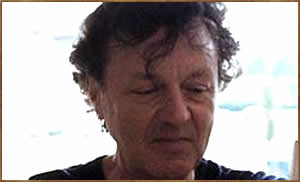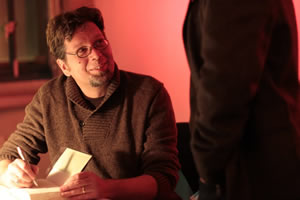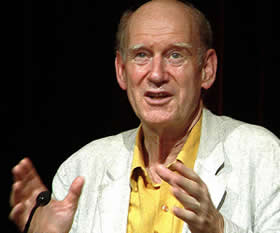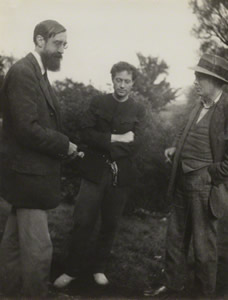|
De Nederlandse dichter, vertaler en journalist Jan Eijkelboom werd op 1 maart 1926 in Ridderkerk geboren. Zie ook alle tags voor Jan Eijkelboom op dit blog.xml:namespace prefix = o ns = "urn:schemas-microsoft-com:office:office" />
Pictures in your head
Beweging zit er niet in:
het zijn stills uit een movie;
meestal stom,
soms met geluid,
kreten van vogels bijvoorbeeld,
zelden een stem.
Ze komen terug, steeds vaker:
Er komen er ook wel bij.
Duizenden plaatjes in
een o zo zwaartillend hoofd.
Je zit er maar mee
op de achterste rij
van je eigen theater.
Een uit de hand gelopen haiku
Maansikkel, koud schoudertje
tegen haast donkerblauw
van zonnige wintermorgen.
Te klein om er mijn hoofd
moe tegenaan te vlijen.
Eerder geschikt om er een hand
zorgzaam omheen te leggen.
Gesteld dan dat ik groter was
tot kosmische proporties uit kon dijen.
Ik zie daar, schurkend in mijn jas
en trouwens onderweg naar jou,
voorlopig nog van af.
Dit Eiland
Heden voelen mijn voeten zich goed
in hun sokken en die weer
in hun ruime maar nog niet
sloffende schoenen.
Waarom dan niet de paden op,
de bergen in, de velden over
bij deze stad vandaan
waar stegen uitlopen op steigers
niet meer door boten gebruikt.
Wel kan men daar gaan staan uitkijken
over het eeuwig veranderlijk
zichzelf blijvende water,
ervaren dat tussen benauwenis
en ruimtezucht een afgepaald
maar onbeklemd domein kan liggen:
dit met een dagmars af te ronden
eiland.

Jan Eijkelboom (1 maart 1926 28 februari 2008)
De Oostenrijkse schrijver, dichter en schilder Franzobel werd geboren op 1 maart 1967 in Vöcklabruck. Zie ook alle tags voor Franznobel op dit blog.
Ode auf Mailand
Mailand, meine Lieben, hat etwas Kurioses.
Schon daß es einzig ist, unwiederholbar,
macht so schnell ihm keiner nach.
Mailand, meine Lieben, hat etwas Furioses,
leicht perverses, weil es so x-beliebig kommt.
So krummbeinig. So rundherum daher.
Es schmeckt nach Marzipan und Knoblauchbrot,
nach lauen Lüftchen, Huschhuschhusch,
nach Jetzt-will-ich-nicht-alleine-sein.
Kalt ist es wie Leberkäse, ausgeraucht,
und warm wie Spucke da im Mund.
Es grinst, wenn es die Gänsehäute
die Rücken runterlaufen sieht, und weint,
wenn man ihm ungerührt entgegentritt.
Mailand, es bringt nichts, nimmt nichts mit,
ist einfach da, macht sichs bequem.
Mailand, meine Lieben, ist etwas Kurioses.
Schon daß es einzig ist, unwiederholbar,
macht so schnell ihm keiner nach.
Liebe 06
Wie ein Füller und ein Bleistift in der Schub-
Lade, liegen wir Dreissigjährigen im Hotelzimmerbett
Umschlugen, warten auf den großen Ladenöffner.
Ein Fernseher im Eck des Zimmers statt
Des Kruzifixes meint: Die Wahrheit liegt schon aufm Platz
Und grölt:
Cupblamage, Cupblamage, Cupblamage
Ball am Kappel unterm Arm, nein, Arsch
Krems an der Donau, Fladnitz Süd,
Ist rund, ist rund, ist rund, ist dreissig,
rund und frägt:
Sind Sie Epileptiker? Ja, vier Dioptrien,
ich verwechsle Hinz und Hechts,
Uben und Onten, Horn und Finten,
Dreissig und Schleissig und Ei
darum war ich Mittelstürmer jahrelang,
aber egal, das Spiel dauert 06 Minuten,
nur für den Goalie [Torhüter] ist es umgekehrt.
.
[Drehtür]
Wenn er nichts verhütet. Häusltor.

Franzobel (Vöcklabruck, 1 maart 1967)
De Engelse schrijver Jim Crace werd geboren op 1 maart 1946 in St. Albans, Hertfordshire. Zie ook alle tags voor Jim Crace op dit blog.
Uit: Quarantine
Miri's husband was shouting in his sleep, not words that she could recognize but simple, blurting fanfares of distress. When, at last, she lit a lamp to discover what was tormenting him, she saw his tongue was black scorched and sooty. Miri smelled the devil's eggy dinner roasting on his breath; she heard the snapping of the devil's kindling in his cough. She put her hand on to his chest; it was soft, damp and hot, like fresh bread. Her husband, Musa, was being baked alive. Good news.
Miri was as dutiful as she could be. She sat cross-legged inside their tent with Musa's neck resting on the pillow of her swollen ankles, his head pushed up against the new distension of her stomach, and tried to lure the fever out with incense and songs. He received the treatment that she five months pregnant, and in some discomfort deserved for herself. She wiped her husband's forehead with a dampened cloth. She rubbed his eyelids and his lips with honey water. She kept the flies away. She sang her litanies all night. But the fever was deaf. Or, perhaps, its hearing was so sharp that it had eavesdropped on Miri's deepest prayers and knew that Musa's death would not be unbearable. His death would rescue her.
In the morning Musa was as numb and dry as leather, but cussed to the last was gripping thinly on to life. His family and the other, older men from the caravan came in to kiss his forehead and mumble their regrets that they had not treated him with greater patience while he was healthy. When they had smelled and tasted the sourness of his skin and seen the ashy blackness of his mouth, they shook their heads and dabbed their eyes and calculated the extra profits they would make from selling Musa's merchandise on the sly.

Jim Crace (St. Albans, 1 maart 1946)
De Zwitserse dichter, schrijver, cabaretier en liedjesmaker Franz Hohler werd geboren op 1 maart 1943 in Biel. Zie ook alle tags voor Franz Hohler op dit blog.
Letzter Zug
Wieso hält denn
der Zug
an jeder Station
wo kein Mensch mehr aussteigt
geschweige denn ein?
Weiß er denn nicht
wie dringend
ich heim muß
zu dir
und wie sehr ich hoffe
du seiest noch wach
wenn ich komme
und wartest auf mich?
Bitte an den Kameramann
Könntest du
Kameramann
das nächstemal
wenn du den Hunger filmst
und auf die Fliegen zoomst
an den Augen des äthiopischen Kindes
könntest du dann
deine Kamera sinken lassen
und statt dessen
die Fliegen vertreiben?
Danke.

Franz Hohler (Biel, 1 maart 1943)
De Britse schrijver Giles Lytton Strachey werd geboren op 1 maart 1880 in Londen. Zie ook alle tags voor Lytton Strachey op dit blog.
Uit: Landmarks In French Literature
Some of these qualities are already distinctly visible in the earliest French works which have come down to us the Chansons de Geste. These poems consist of several groups or cycles of narrative verse, cast in the epic mould. It is probable that they first came into existence in the eleventh and twelfth centuries; and they continued to be produced in various forms of repetition, rearrangement, and at last degradation, throughout the Middle Ages. Originally they were not written, but recited. Their authors were the wandering minstrels, who found, in the crowds collected together at the great fairs and places of pilgrimage of those early days, an audience for long narratives of romance and adventure drawn from the Latin chronicles and the monkish traditions of a still more remote past. The earliest, the most famous, and the finest of these poems is the Chanson de Roland, which recounts the mythical incidents of a battle between Charlemagne, with all his peerage, and the hosts of the Saracens. Apart from some touches of the marvellous such as the two hundred years of Charlemagne and the intervention of angels the whole atmosphere of the work is that of eleventh-century France, with its aristocratic society, its barbaric vigour, its brutality, and its high sentiments of piety and honour. The beauty of the poem lies in the grand simplicity of its style. Without a trace of the delicacy and variety of a Homer, farther still from the consummate literary power of a Virgil or a Dante, the unknown minstrel who composed the Chanson de Roland possessed nevertheless a very real gift of art. He worked on a large scale with a bold confidence. Discarding absolutely the aids of ornament and the rhetorical elaboration of words, he has succeeded in evoking with an extraordinary, naked vividness the scenes of strife and heroism which he describes.

Lytton Strachey (1 maart 1880 21 januari 1932)
Lytton Strachey, de schilder Duncan Grant en de criticus (Arthur) Clive Bell in 1922
Zie voor nog meer schrijvers van de 1e maart ook mijn blog van 1 maart 2012 deel 1 en ook deel 2 en eveneens deel 3.
|



